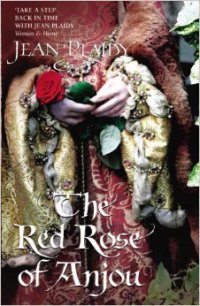Daughters of Spain - Plaidy Jean (онлайн книга без TXT) 📗
He thought ruefully that she would seek to protect Catalina from his marriage plans in the same way as she had stubbornly refused to give Toledo to his son Alfonso. Yet he was bound to her as she was to him. They were one; they were Spain.
Isabella was thinking only of her daughter as she hastened to the children’s apartments. It was as she had expected: Catalina was alone. The child lay on her bed and her face was buried in the pillows as though, thought Isabella tenderly, by hiding her eyes she need not see what was too unpleasant to be borne.
‘My little one,’ whispered the Queen.
Catalina turned, and her face was illumined with sudden joy.
Isabella lay down and took the child in her arms. For a few moments Catalina clung childishly to her mother as though by doing so she could bind them together for ever.
‘I did not mean you to know for a long, long time,’ whispered the Queen.
‘Mother … when shall I go away from you?’
‘My dearest, it will not be for years.’
‘But my father said …’
‘Oh, he is an impatient man. He loves his daughters so much and is so happy in the possession of them that he longs to see them with children of their own. He forgets how young you are. A little girl of ten to be married!’
‘Sometimes they are taken away from their mothers to live in foreign courts … the courts of their bridegrooms.’
‘You shall not leave me for many years. I promise you.’
‘How many, Mother?’
‘Not until you are grown up and ready for marriage.’
Catalina snuggled closer to her mother. ‘That is a long, long time. That is four years, or five years perhaps.’
‘It is indeed. So you see how foolish it would be to worry now over what may happen in four or five years’ time. Why, by then you will be almost a woman, Catalina … wanting a husband of your own perhaps, not so eager to cling to your mother.’
‘I shall always cling to my mother!’ Catalina declared passionately.
‘Ah,’ sighed Isabella, ‘we shall see.’
And they lay silently side by side. Catalina was comforted. To her, four or five years seemed an eternity. But to her mother it seemed a very little time.
But the purpose was achieved, the blow was softened. Isabella would talk to her young daughter about England. She would discover all she could about the Tudor King who, some said, had usurped the throne of England. Though of course it would be well if the child did not hear such gossip as that. She would talk to her about the King’s children, the eldest of whom was to be her husband … a boy a year younger than herself. What was there to fear in that? There was another boy, Henry; and two girls, Margaret and Mary. She would soon learn their ways and in time forget about her Spanish home.
That was not true, she knew. Catalina would never forget.
She is closer to me than any of the others, I believe, thought Isabella. How happy I should be if this English marriage came to nothing and I were able to keep my little Catalina at my side until the day I die.
She did not mention such a thought. It was unworthy of the Queen of Spain and the mother of Catalina. At this time it seemed that Catalina’s destiny lay with the English. As a daughter of Spain, Catalina would have to do her duty.
![]()
![]()
XIMENES AND TORQUEMADA
The cavalcade had come to rest at last in the port of Laredo which stood on the eastern borders of the Asturias. During the journey from Madrid to Laredo the Queen’s anxieties had kept pace with her daughter’s increasing excitement.
Isabella had determined to remain with Juana until that moment when she left Spanish soil. She would have liked to accompany her all the way to Flanders, for she was very fearful of what would await her wild daughter there.
Isabella had left her family and her state duties to be with her daughter, and during that long and often tedious journey she had never ceased to pray for Juana’s future and to ask herself continually: What will become of her when she reaches Flanders?
Isabella had spent a night on board that ship in which Juana would sail. She now stood on deck with her daughter, awaiting the moment of departure when she must say farewell to Juana. About them was a fine array of ships, a fleet worthy of the Infanta’s rank which would carry her to Flanders and bring back the Archduchess Margaret to be Juan’s bride. There were a hundred and twenty ships in this magnificent armada, some large, some small. They carried means of defending themselves, for they had been made ready to fight against the French. Ferdinand, however, had been willing to put them to this use, because in conveying his unstable daughter to Flanders they were prosecuting the war against the French as certainly as if they went into battle.
Ferdinand himself was not with them on this occasion. He had gone to Catalonia to make ready for an attack on the French. Isabella was rather pleased that she was alone to say goodbye to Juana. So great were her anxieties that she could not have borne to see the pleasure which she knew would shine from her husband’s eyes as he watched their daughter’s departure.
Juana turned to her mother, her eyes sparkling, and cried: ‘To think that all that is for me!’
Isabella continued to look at the ships, because she could not bear to look into her daughter’s face at that moment. She knew that she was going to be reminded of her own mother, who was living out her clouded existence at the castle at Arevalo, unable to distinguish between past and present, raging now and then against those who were long since dead and had no power to harm her. There had been times when Isabella had dreaded her mother’s outbreaks of violence, even as she now dreaded those of her daughter.
How will she fare with Philip? was another question she asked herself. Will he be kind to her? Will he understand?
‘It is a goodly sight,’ murmured the Queen.
‘How long before I reach Flanders, Mother?’
‘So much will depend on the weather.’
‘I hope there will be storms.’
‘Oh, my child, no! We must pray for calm seas and a good wind.’
‘I should like to be delayed a little. I should like Philip to be waiting for me … rather impatiently.’
‘He will be waiting for you,’ murmured the Queen.
Juana clasped her hands across her breasts. ‘I long for him, Mother,’ she said. ‘I have heard that he is handsome. Did you know that people are beginning to call him Philip the Handsome?’
‘It is pleasant to have a handsome bridegroom.’
‘He likes to dance and be gay. He likes to laugh. He is the most fascinating man in Flanders.’
‘You are fortunate, my dear. But remember, he is fortunate too.’
‘He must think so. He shall think so.’
Juana had begun to laugh; it was the laughter of excitement and intense pleasure.
‘Soon it will be time to say goodbye,’ said the Queen quickly. She turned impulsively to her daughter and embraced her, praying as she did so: ‘Oh God, let something happen to keep her with me. Let her not go on this long and hazardous journey.’
But what was she thinking! This was the grandest marriage Juana could have made. It was the curse of Queens that their daughters were merely lent to them during their childhood. She must always remember this.
Juana was wriggling in the Queen’s arms. It was not her mother’s embrace that she wanted; it was that of her husband.
Will she be too eager, too passionate? wondered the Queen. And Philip – what sort of man is he? How I wish I could have met him, had a word with him, warned him that Juana is not quite like other girls.




